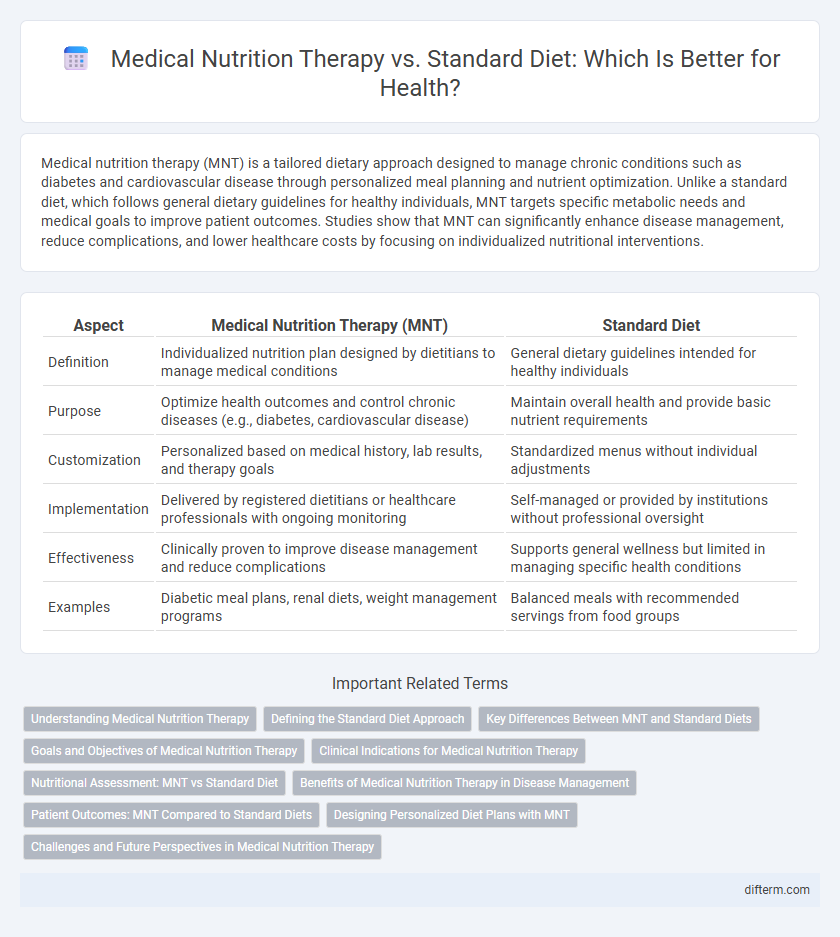Medical nutrition therapy (MNT) is a tailored dietary approach designed to manage chronic conditions such as diabetes and cardiovascular disease through personalized meal planning and nutrient optimization. Unlike a standard diet, which follows general dietary guidelines for healthy individuals, MNT targets specific metabolic needs and medical goals to improve patient outcomes. Studies show that MNT can significantly enhance disease management, reduce complications, and lower healthcare costs by focusing on individualized nutritional interventions.
Table of Comparison
| Aspect | Medical Nutrition Therapy (MNT) | Standard Diet |
|---|---|---|
| Definition | Individualized nutrition plan designed by dietitians to manage medical conditions | General dietary guidelines intended for healthy individuals |
| Purpose | Optimize health outcomes and control chronic diseases (e.g., diabetes, cardiovascular disease) | Maintain overall health and provide basic nutrient requirements |
| Customization | Personalized based on medical history, lab results, and therapy goals | Standardized menus without individual adjustments |
| Implementation | Delivered by registered dietitians or healthcare professionals with ongoing monitoring | Self-managed or provided by institutions without professional oversight |
| Effectiveness | Clinically proven to improve disease management and reduce complications | Supports general wellness but limited in managing specific health conditions |
| Examples | Diabetic meal plans, renal diets, weight management programs | Balanced meals with recommended servings from food groups |
Understanding Medical Nutrition Therapy
Medical nutrition therapy (MNT) involves customized dietary plans designed by registered dietitians to manage specific medical conditions such as diabetes, cardiovascular diseases, and renal disorders. Unlike a standard diet, which provides generalized nutritional guidelines, MNT targets nutrient intake to improve health outcomes, regulate metabolic processes, and reduce disease complications. Research shows that MNT significantly enhances glycemic control, lipid profiles, and blood pressure compared to non-tailored dietary interventions.
Defining the Standard Diet Approach
The Standard Diet Approach in healthcare typically involves a general nutritional plan designed to meet basic dietary guidelines without targeting specific medical conditions. It emphasizes balanced intake of macronutrients and essential vitamins based on population averages, aiming to maintain overall health. Unlike Medical Nutrition Therapy (MNT), it lacks personalized adjustments for chronic diseases or metabolic disorders.
Key Differences Between MNT and Standard Diets
Medical nutrition therapy (MNT) is a personalized dietary approach designed to manage specific medical conditions such as diabetes, cardiovascular disease, and kidney disorders through tailored nutrient intake and ongoing clinical assessment. Standard diets provide general nutritional guidance based on broad population needs without individualized adjustments or targeted therapeutic goals. Key differences include MNT's emphasis on evidence-based, disease-specific interventions versus the generalized nutrient recommendations found in standard diets.
Goals and Objectives of Medical Nutrition Therapy
Medical Nutrition Therapy (MNT) targets personalized dietary interventions to manage chronic conditions such as diabetes, cardiovascular disease, and renal disorders, optimizing nutrient intake to improve clinical outcomes. Its primary goals include modifying nutrient composition to control symptoms, prevent complications, and support overall health, unlike standard diets that offer generalized nutritional guidelines. MNT utilizes evidence-based strategies to tailor nutrition plans for metabolic control, weight management, and enhancing quality of life in patients with specific medical needs.
Clinical Indications for Medical Nutrition Therapy
Medical Nutrition Therapy (MNT) is clinically indicated for managing chronic conditions such as diabetes, cardiovascular disease, renal failure, and gastrointestinal disorders. Unlike a standard diet, MNT involves personalized nutritional interventions tailored to the patient's specific metabolic and medical needs, improving disease outcomes and quality of life. Evidence supports MNT's role in reducing complications, optimizing nutrient intake, and supporting therapeutic goals in hospital and outpatient settings.
Nutritional Assessment: MNT vs Standard Diet
Medical nutrition therapy (MNT) utilizes a comprehensive nutritional assessment that includes biochemical data, clinical evaluation, dietary intake analysis, and anthropometric measurements to develop personalized dietary plans. In contrast, a standard diet typically relies on general dietary guidelines without detailed individual assessments, limiting its effectiveness in managing specific health conditions. The tailored approach of MNT enhances treatment outcomes by addressing unique metabolic and nutritional needs, which standard diets often overlook.
Benefits of Medical Nutrition Therapy in Disease Management
Medical nutrition therapy (MNT) offers tailored dietary plans that address specific disease processes, enhancing metabolic control and improving patient outcomes compared to standard diets. Evidence shows MNT significantly benefits management of chronic conditions such as diabetes, cardiovascular diseases, and kidney disorders by reducing complications and hospitalization rates. Personalized nutrient intake in MNT supports immune function, promotes tissue repair, and optimizes medication efficacy, making it a crucial component in comprehensive disease management.
Patient Outcomes: MNT Compared to Standard Diets
Medical nutrition therapy (MNT) significantly improves patient outcomes by customizing nutrient intake to manage chronic diseases such as diabetes, cardiovascular disorders, and kidney conditions. Studies reveal that MNT leads to better glycemic control, reduced hospital readmissions, and enhanced quality of life compared to standard diets. Tailored nutritional interventions in MNT optimize metabolic parameters and accelerate recovery, proving more effective than generic dietary guidelines.
Designing Personalized Diet Plans with MNT
Medical nutrition therapy (MNT) offers tailored dietary interventions based on individual health conditions, biochemical data, and lifestyle factors, unlike standard diets that follow generic guidelines. Personalized diet plans designed through MNT improve management of chronic diseases such as diabetes, cardiovascular disorders, and gastrointestinal issues by targeting specific nutrient needs and metabolic responses. Integrating continuous monitoring and professional adjustments enhances treatment efficacy and patient adherence, making MNT a critical component in precision nutrition and health optimization.
Challenges and Future Perspectives in Medical Nutrition Therapy
Medical nutrition therapy (MNT) faces challenges including limited patient adherence, variable insurance coverage, and a shortage of trained dietitians, which hinder its widespread implementation compared to standard diets. Advances in personalized nutrition, integration of digital health tools, and expanded clinical guidelines hold promise for improving effectiveness and accessibility of MNT. Future perspectives emphasize leveraging genomics and metabolomics to tailor interventions and enhance patient-specific outcomes in managing chronic diseases.
Medical nutrition therapy vs Standard diet Infographic

 difterm.com
difterm.com